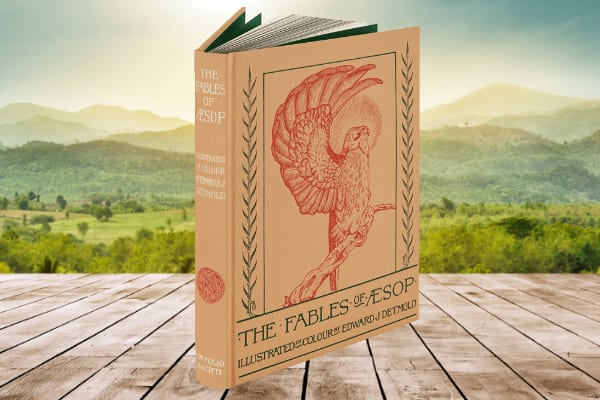Aesop: the Ancient Greek slave whose stories guide us today
Aesop: the Ancient Greek slave whose stories guide us today
Aesop: the Ancient Greek slave whose stories guide us today
-
Hannah
-
Hannah


‘Pride comes before a fall,’ we say. ‘Honesty is the best policy… and look before you leap.’
Have you ever considered where these little axioms of wisdom originated? The answer is: the stories of a man named Aesop who lived in Ancient Greece.
I grew up with a governess who would tell me Aesop’s Fables, as they are commonly known, at bedtime. The Hare and the Tortoise, The Ant and the Grasshopper, The Lion and the Mouse – I loved these simple stories designed to explain our world and teach basics morals by which we should live. What I loved most, though, was that my governess wouldn’t read the stories to me from a book, but would tell them from her own memory, embellishing the basic tales with her imagination.
The history of Aesop’s Fables, in fact, is one of oral storytelling and of adaptation. Aesop was a slave who, it is believed, lived in Ancient Greece between 620 and 564 BC. He told stories, and those who heard his stories repeated his stories, and so on, over hundreds of years. Eventually, writers began to put the stories down on paper, and then the printing press was invented, and some of the earliest books were compilations of Aesop’s Fables. All over the world, people told and retold the stories in all different languages, and to this day they continue to be told – and reimagined.
In my novel Aphrodite’s Tears, the Greek hero Damian enjoys educating Oriel, an Englishwoman, about his people by telling her some of their stories. Mythology plays a big part in the novel, as the title suggests. But no story is told simply to entertain; there is a meaning – a lesson – in each old story that has been passed down from generation to generation, and often this is a deeper meaning that is important to how we live.
Take, for example, Aesop’s story of Zeus and the Tortoise. Zeus was the Greek god of the sky and thunder, and the god of all gods. Aesop told how he invited all in the animal kingdom to his wedding, but one creature, the tortoise, didn’t turn up. When Zeus challenged the tortoise, her response was that she preferred to stay home than go to his celebration. Οἶκος φίλος, οἶκος ἄριστος was her excuse, which translates to ‘the home you love is the best’. Zeus decided if the tortoise loved her home so much, she could stay there, always – and that is how the tortoise got her shell.
Within this story, the fundamental truth is ‘the home you love is the best’. Over time, this became a proverbial saying. Eventually, it was rephrased to ‘there’s no place like home’. (These words were not first coined by Judy Garland in The Wizard of Oz, in fact, but were from a line in a popular song called ‘Home, Sweet Home’, written in 1823.)
Here are some other words of wisdom that we owe to Aesop:
‘Pride comes before a fall’ – from The Eagle and the Cockerels
‘Honesty is the best policy’ – from Mercury and the Woodman
‘Look before you leap’ – from The Fox and the Goat
‘Don’t count your chickens before they hatch’ – from The Milkmaid and Her Pail
‘A bird in the hand is worth two in the bush’ – from The Hawk and the Nightingale
‘Out of the frying pan, into the fire’ – from The Stag and the Lion
‘Birds of a feather flock together’ – from The Farmer and the Stork
‘Slow and steady wins the race’ – from The Hare and the Tortoise
You can read more expressions and the origin stories here: http://mentalfloss.com/article/58530/19-everyday-expressions-came-aesop
Perhaps Aesop should have added to his proverbs, ‘Be careful which truths you tell.’ According to The Aesop Romance, written sometime around the first century, Aesop won his freedom from slavery through his clever storytelling, and he travelled around courts, entertaining and advising kings – until he came to Delphi, where the citizens were insulted by the morals in his stories and responded by forcing him to jump to his death off a cliff.
Of course, The Aesop Romance is most likely fictional, but it does touch on the fact that people can resist hearing truths that challenge their way of living. How will Oriel react, then, to Damian’s storytelling in Aphrodite’s Tears? With an open mind – or with resistance?
If you would like to read Aesop’s Fables, the Folio Society have published a beautifully illustrated edition (pictured). Visit http://www.foliosociety.com/uk/fables-of-aesop.html for details.
It is common to believe only ones own truth.